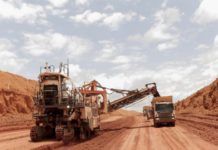[miningmx.com] — Zambia, Africa’s top copper producer, expects to achieve its highest copper output in almost 40 years this year and is well on track for a million tonnes by 2012, Mines Minister Maxwell Mwale said on Tuesday.
“In 2010, we are projecting that we should get to about 750,000 metric tonnes. That was a figure last achieved in 1973,” Mwale told Reuters in an interview in his offices in the capital, Lusaka.
In December, the central bank raised its 2009 copper output forecast to 692,604 tonnes from the previous estimate of 664,000 tonnes after a rise in output at Zambia’s mines.
Mwale also sought to quash persistent speculation about the introduction of a windfall tax that would allow the government to cash in on the dramatic rebound in copper prices from their lows during the world economic crisis a year ago.
“The long-term view of this government is that we will not be introducing a windfall tax, as we would like to see the jobs of our people preserved,” he said.
The new Konkola Deep Mining project in the heart of the Copper Belt along Zambia’s northern border with Democratic Republic of Congo should lift output to 500,000 tonnes in the next three years, Mwale said, putting Zambia on track for overall production of a million tonnes by 2012.
“That is a realistic projection,” he said. “The key is that the new operations have to ramp up production.”
Exploration was expanding beyond the traditional confines of the Copper Belt, which has been in operation for a century, up into the northwest, he said.
In that region, Canada’s First Quantum was expected to develop a new mine at Kiwara, while a number of Chinese companies, including Zhonghui, were also exploring other potential sites.
“We expect that they too should be progressing towards the development of a mine,” Mwale, a former mining engineer, said.
Chinese companies are major players in the Copper Belt, and came in at very short notice last year to rescue the Luanshya mine which shut due to the late 2008 collapse in copper prices.
However, they have often been the source of local resentment and the target of attacks by the opposition.
Mwale admitted there were differences between Chinese and Zambian ways of working, but dismissed criticisms on wages and safety.
“The Chinese are operating just as well as any other investor in this country,” he said.
“They have their own home country cultures, and we as a host country have our host country culture. It is up to us as a government to see that at some point, the two cultures have to converge.”
However, he did say external operators who short-changed both workers and the communities in which they sat might face sanctions – notably in the form of government increasing its stake in a concern to as much as 25 percent.
“If we see that you are a fly-by-night investor, we may be forced to take measures for the benefit of our people,” he said. “But we don’t want to see ourselves get to that stage. This is why we are feeling that the investors should be responsible.”
Some other foreign mining companies in Zambia include Glencore International AG of Switzerland and Metorex










